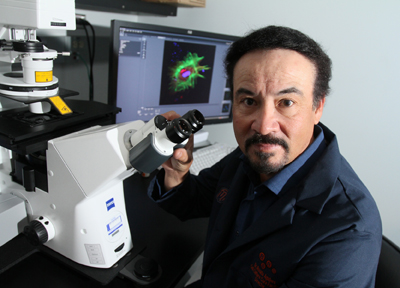By Chris Lechuga
UTEP News Service
During his early years as an undergraduate student at The University of Texas at El Paso in the late 1970s, Renato Aguilera was unsure what career path he should follow. He had an interest in science, especially biology, but did not want to pursue a medical degree like many of his classmates.
Looking for inspiration, Aguilera, now a professor of biological sciences at UTEP, discovered a program that trained undergraduate students to conduct effective biological research. He applied and was accepted into the Minority Biomedical Research Support (MBRS) program and was soon conducting research in immunology.
“I knew exactly then that this is what I wanted to do,” Aguilera said.
After graduating from UTEP in 1981 and ’82 with bachelor’s and master’s degrees in biology, Aguilera excelled in his doctoral program at the University of California, Berkley, thanks to the training and mentoring he received while in the UTEP program.
Aguilera went on to become an assistant professor at the University of California, Los Angeles, where he helped establish the Center for Academic and Research Excellence that became one of the most successful minority undergraduate research training programs in the nation. It was then that he received a call from his alma mater.
“UTEP had lost the same program that trained me, mainly the training component,” Aguilera said. “That’s one of the reasons I was recruited.”
Within one year of his return to UTEP in 2002, Aguilera re-established the then defunct MBRS program that was renamed the Research Initiative for Scientific Enhancement (RISE) and secured funding for his research through a grant from the National Institutes of Health (NIH). Since then, Aguilera and other program faculty have trained more than 100 undergraduate students in a variety of research techniques.
In August, the RISE Program was awarded a five-year grant renewal from the National Institutes of Health (NIH) totaling more than $4.2 million – its third funding renewal since 2003. The grant will provide financial support for 35 undergraduate scholars and nine doctoral trainees from the colleges of science and engineering to learn how to conduct biomedical research.
Margaret Costanzo is one of the students who went through the program as an undergraduate with Aguilera’s mentorship. She graduated with a bachelor’s degree in biology in 2006 from UTEP and earned a doctoral degree in pathobiology from UTEP in 2012. She has decided to stay at the University to conduct her postdoctorate work.
She described her experience in the RISE program as exceptional and strongly recommends any student interested in science and research to take advantage of the opportunity.
“If it were not for this program, I would not have had the opportunity to obtain research experience during my undergraduate studies,” Costanzo said. “The RISE program also provided excellent training for me in regard to presenting my research at national meetings and learning how to read and interpret scientific literature.”
As a scientist, Aguilera feels a sense of giving back to the community that supported him during his studies. He takes pride in the success his students have achieved who started the RISE program at the same point in their academic careers as he had.
“Based on my positive experiences, and the fact that it was transformative to me, I have devoted most of my career to training students,” he said.
